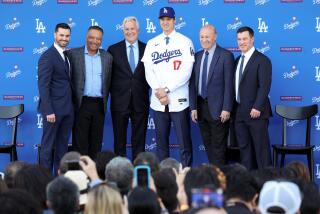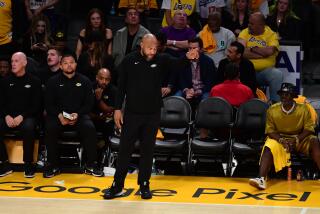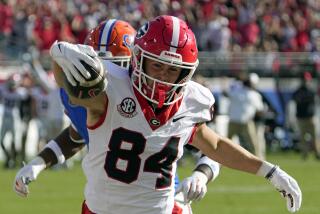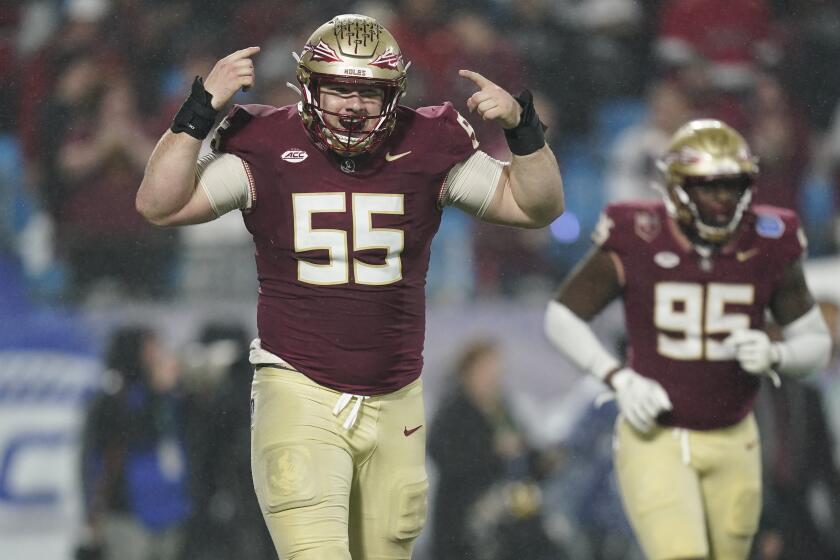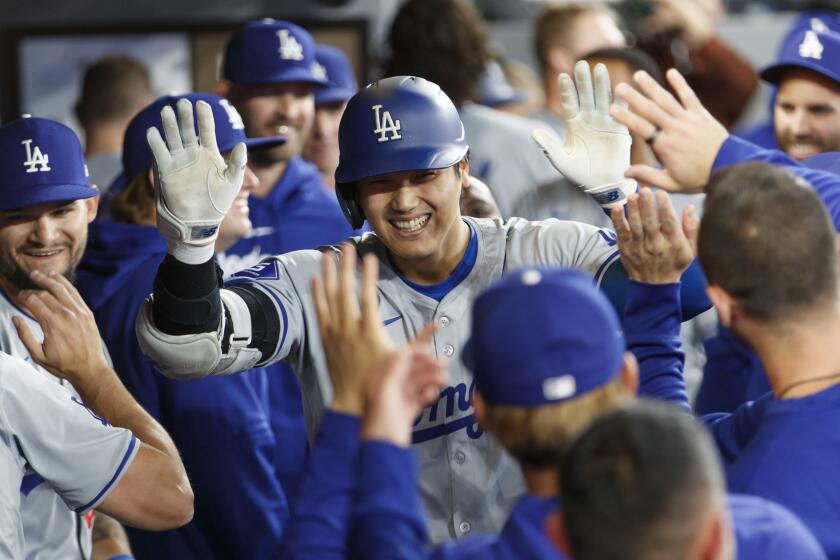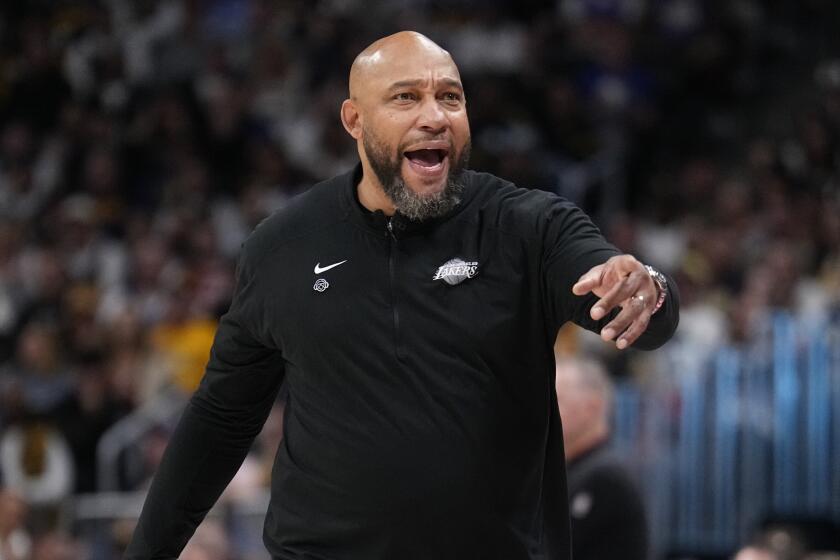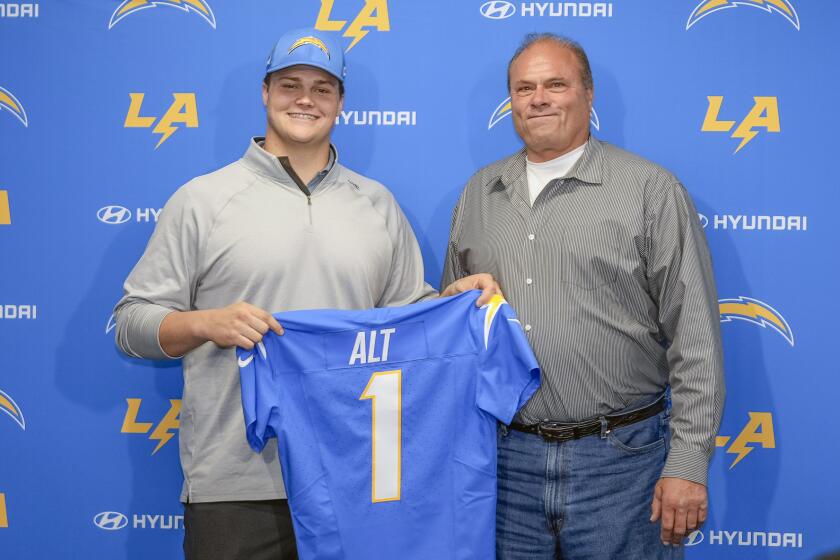Trouble in New Orleans spills over into NBA
It’s an hour before tipoff and Chris Dubois, a diehard New Orleans Hornets fan clad in the NBA team’s blue and gold jersey, sips a beer in a party zone outside the New Orleans Arena. A brass band plays nearby and, across the street, the imposing Louisiana Superdome rises 27 stories into the twilight.
Five years ago, it was a torn and battered Superdome that held the nation’s attention — the iconic image of the devastation Hurricane Katrina heaped on the Gulf Coast — as evacuees streamed down this street, desperate for shelter.
Dubois, a 43-year-old New Orleans native, knows Girod Street well. He also knows that this city, nearly broken by Katrina and bowed by the massive BP oil spill in the Gulf of Mexico last year, does not want to take any more body blows. Especially from the NBA.
“If we lose the Hornets, it’s a black eye,” he says. “We need them.”
The question is whether the NBA needs New Orleans.
Two weeks ago, the league did the unthinkable. It became an owner, completing its acquisition of the Hornets for an estimated $300 million-plus.
The debt-ridden team’s wilting financial health accelerated the process after Commissioner David Stern made it clear he would not let an NBA franchise go bankrupt, nor would he allow a fire sale.
Stern’s stated goal is to stabilize the Hornets and then find new owners who would stay here. He named veteran sports executive Jac Sperling, a New Orleans native, to oversee the team’s turnaround and resale.
“Right now we are pedal down to make it work” in New Orleans, Hornets President Hugh Weber said.
Since the NBA stepped in, no outside offers to buy the Hornets have surfaced publicly. However, billionaire Larry Ellison was quoted in the San Jose Mercury News this week as saying he offered $350 million to buy the team but was outbid by the NBA.
There is another threat to local ownership. After Jan. 31 the Hornets can opt out of the lease with the state-owned arena if average attendance fails to meet a benchmark of 14,735 a game. So far, the Hornets are averaging 14,086 this season in an arena that holds 17,988 for NBA games.
Winning has not helped. Led by Chris Paul, the NBA’s rookie of the year in 2005-06 and a two-time All-Star, the Hornets had a franchise-record 8-0 start this season but attendance lagged. This season the team has had only two sellouts, the first Nov. 5 when they beat LeBron James and the Miami Heat. The other came last week in a loss to the Lakers, who play the Hornets again Friday night at Staples Center.
And there is more worry on the horizon: Come July 1, the NBA labor contract expires and with it, the threat of a work stoppage.
Even so, New Orleans is trying to fight back — almost an automatic response now for this city.
Government and business leaders led by Louisiana Gov. Bobby Jindal and New Orleans Mayor Mitchell Landrieu recently urged fans to buy tickets so that the team’s owners can’t opt out of the lease.
“The future is in our hands,” Jindal said. Considered a potential Republican presidential candidate in 2012, Jindal also said he would consider adding incentives in the state’s lease to bolster the team but cautioned, “We’re certainly not going to take money away from higher education or health care to give to the Hornets.”
Landrieu tried to stay upbeat.
“I feel very comfortable that the NBA is committed to keeping a team in New Orleans,” he said. “There’s always a chance that you can lose the team, so I think people can’t take it for granted.”
Pro sports teams jumping to one city from another always stir deep emotions, and blast an economic hole, in the communities left behind. Just ask fans in Brooklyn who were devastated when baseball’s Dodgers moved to Los Angeles in 1958, or the Southern California fans still angry about their Rams moving to St. Louis in 1995.
But weary New Orleans, in particular, can do without another setback.
After making notable strides in recovering from Katrina — perhaps best embodied by the Saints winning last year’s Super Bowl — the Big Easy was knocked down again by an economic maelstrom: the recession, the oil spill and a subsequent moratorium on deep-water drilling in the gulf.
“This city has seen a series of events that you would not wish on any other American community,” said Arnold Fielkow, the city council’s president and a former Saints executive. “It would be a terrible loss for this community to not have the Hornets.”
Not everyone is happy about the NBA becoming a team owner, though.
Last week, when the Lakers came to town, Coach Phil Jackson took aim at the league’s action. His biggest concern: What if Paul wants out?
“When Chris says he has to be traded, how’s that going to go?” Jackson said. “Someone’s going to have to make a very nonjudgmental decision on that part that’s not going to irritate anyone else in the league.”
He also questioned keeping a team in this city, saying, “It hasn’t been successful in supporting a team until now.”
Yes, New Orleans has been in this spot before. In 1974, the city won the expansion Jazz, but five years later lost the franchise after majority owner Sam Battistone pulled up stakes and moved it to Salt Lake City, where it was rechristened the Utah Jazz.
More than two decades later, New Orleans got another chance when George Shinn, majority owner of the Hornets, moved the team here from Charlotte in 2002. Katrina forced the Hornets to Oklahoma City for two seasons, but by 2007 they were back home and part of New Orleans’ storybook comeback.
Toward the end of last season, Gary Chouest, a Louisiana oil services executive who owned 35% of the Hornets, began talks to buy out Shinn and take overall control. When the deal didn’t materialize, the NBA moved in.
“The NBA has come to town and said, ‘Listen, New Orleans, we’re buying your team and we may take it away from you, and what do you think about that?’” said Morris Bart, a New Orleans lawyer and fervent Hornets fan.
And, unlike being whipsawed by a hurricane or oil spill, New Orleans in this case has a measure of control in deciding the Hornets’ future.
Bart, for one, sees the NBA’s takeover as a civic challenge and has said he is willing to buy 10% of the franchise if other local owners purchase the rest. Paul, who wears No. 3 and is known affectionately in New Orleans as “CP3,” hopes Bart and others do just that.
“I would love to see the team stay here,” Paul said. “The fans deserve a team here.”
Hornets forward David West said the players were doing their best to tune out the ownership matter and simply win games, but he acknowledged it’s not always easy.
“This is a job, and just as with anyone else in the workforce, if you don’t know who your boss is or what direction you’re headed, those thoughts come into your mind,” West said.
The Hornets, of course, are not the first struggling pro team to fall under league control.
The Montreal Expos were bought by Major League Baseball in 2002 and three years later became the Washington Nationals. This year the Texas Rangers managed to avoid the league ownership route after being sold at auction.
The NHL bought its Phoenix Coyotes franchise, which also was in bankruptcy, and is preparing to resell the team to a Chicago businessman who would keep the team in Arizona. The NHL last month said it also might seek “alternatives” for its Atlanta Thrashers if that city doesn’t show more support for the team, despite its winning record.
In the New Orleans metro region, one of the smaller NBA markets with a population of about 1.2 million, it’s also a question of whether residents care enough to keep their team.
Their devotion has been tested. After New Orleans hosted the 2008 NBA All-Star game and the Hornets had a winning 2008-09 season, the team slumped to 37-45 last season and missed the playoffs.
Season-ticket sales reportedly tumbled to below 7,000 this season from more than 10,000 two years ago. Weber, the team president, wouldn’t confirm those figures but said “it’s fair to say that we had a significant amount who didn’t renew.”
The threat of a work stoppage also weighs on the franchise. The NBA’s collective bargaining agreement with its players union expires July 1 and both sides are far apart on their demands.
Potential labor unrest reportedly was among the reasons why Chouest’s plan to buy the team went awry. Chouest declined comment, but Bart said Chouest remained willing to step back in and “purchase more than 50% of the team along with a local, committed investor group.”
The Hornets “are part of the resurgence of New Orleans,” Bart said. “If we just sit here and do nothing, then our silence is going to be taken as consent to the NBA doing whatever they want or, even worse, that we don’t care.”
More to Read
Get our high school sports newsletter
Prep Rally is devoted to the SoCal high school sports experience, bringing you scores, stories and a behind-the-scenes look at what makes prep sports so popular.
You may occasionally receive promotional content from the Los Angeles Times.
